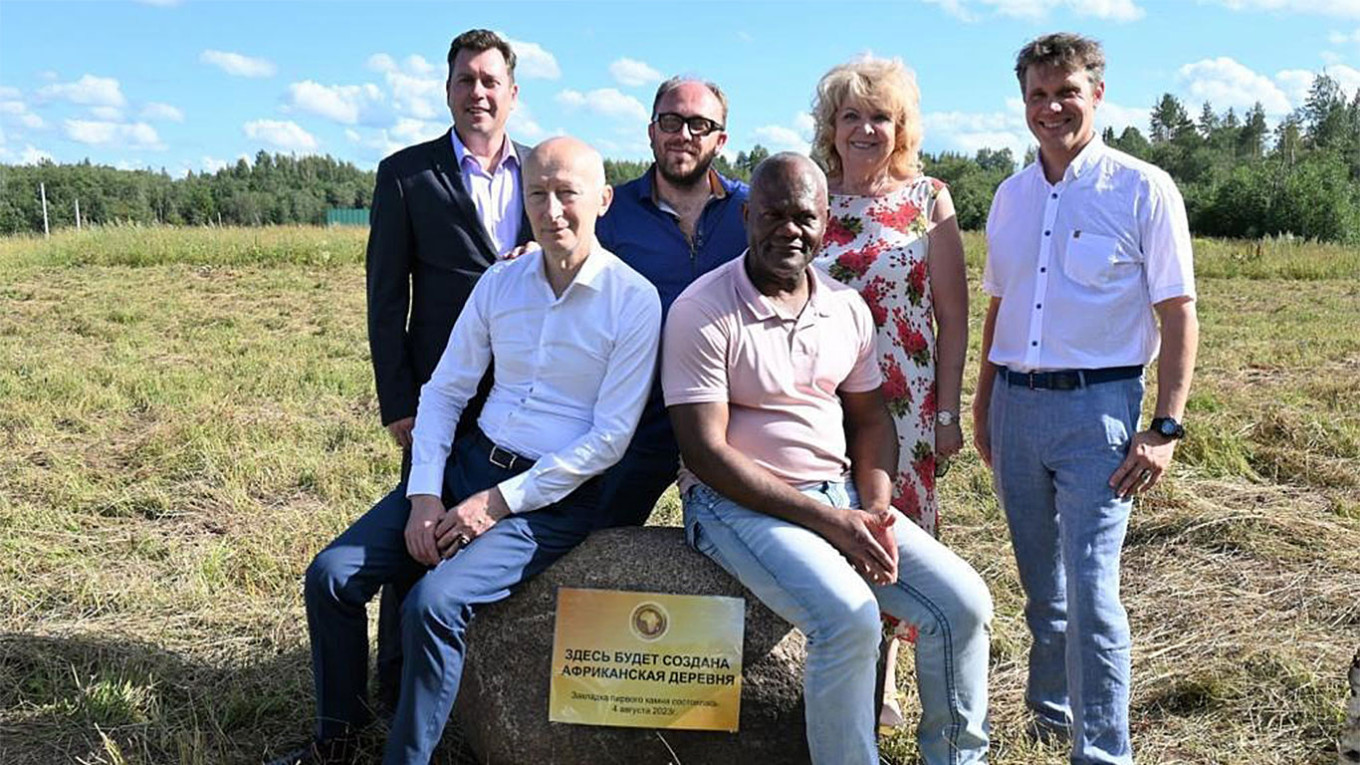An extremely unusual event for Russia’s hinterland took place in the small village of Porechye halfway between St. Petersburg and Moscow on Aug. 4. Several dozen people, many of them Black, took part in a solemn ceremony of laying the first stone of an “African village.”
The irony of this project is that it has nothing to do with helping Black Africans fleeing poverty and war, despite its name. On the contrary, the initiative betrays Russia’s profound preoccupation with “race” and “whiteness”, and that it has more in common with the ideology of Western colonialists than it would like prospective African allies to believe.
The presence of local officials signaled that the event was more than just a private initiative. Indeed, as the Agriculture Ministry’s official account on VKontakte asserted, the village of Porechye “has become the center of the region’s international agenda” to build stronger relationships between Russia and Africa.
Reportedly, the program has already received the backing of President Vladimir Putin.
The symbolic establishment of what a local television channel called an “ethnic African village” in the Tver region came on the heels of the African International Congress, a business forum that took place in Moscow in early April, months before the higher-profile Russia-Africa Summit in St. Petersburg. According to congress co-chair and project mastermind Konstantin Klimenko, the village is just the first step in a large-scale settlement project. It envisages the establishment of 30 “African colonies” in different parts of the country, with an expected 3,000 African families coming to start their new life in the Russian countryside.
Since 2019, the Kremlin has invested heavily in its charm offensive in Africa, sprinkled liberally with anti-colonial and anti-Western rhetoric — an effort that has only intensified since its full-scale invasion of Ukraine. But even against this backdrop, the decision to settle thousands of Africans throughout Russia would seem a bold move. So far, the migration of Africans to Russia has been negligible: in 2022, only 38,885 Africans stayed in Russia legally, 34,360 of whom were students.
Only White settlers are expected to move into these new African villages in Russia. In a March 2023 post on VK, Klimenko made clear that the incomers would be Afrikaner farmers, the descendants of Europeans who settled in South Africa. In Klimenko’s view, these people now wish to leave their homes because “times have changed” for Afrikaners (one may assume, since the end of apartheid) and “everything has become tolerant ... And it is not comfortable, sometimes even dangerous, for the Boers to live with their neighbors.” The African village is thus a rescue mission that aims to protect White Europeans from supposed oppression by Black Africans.
Klimenko’s tolerance has its limits, however. If people of European descent are welcome to come and live in Russia, others are clearly not. Those include migrants from Central Asia who are, in common Russian parlance, not quite White. This is why Klimenko, who earlier called labor migrants in Russia a “threat” to national security and part of the “fifth column,” was quick to reassure one of his followers on VK, anxious about the arrival of “tens of thousands of Africans in the Russian land,” by stressing that they are Europeans. He added that the real cause for alarm lies elsewhere, given that “50,000 Tajiks become Russian citizens each year.”
A public figure who launched a great number of dubious business projects, Klimenko is now mainly active as the rector of the online Eurasian International University based out of Moscow. Its website goes as far as to claim it “should become the leading university in Eurasia.” However, Klimenko’s accounts on social media are the only available source of information about its activities. One of them is to offer a Russian-language course that Afrikaners are supposed to take before settling in Porechye.
Of all places, this seemingly unlikely destination for the settlement of Afrikaner migrants was chosen for a reason. The “African village” in Porechye will be located on a land plot rented by Trofimov Dvor, a large and successful private farm. Its owner, Alexei Trofimov, harbors a sense of nostalgia for the Russian Empire and sees authoritarianism as the model most suited to Russia’s needs. Apparently, Trofimov considers his participation in the project as a contribution to Russia’s greatness. “Our great President Vladimir Putin set the task: to strengthen the influence of Russia in the African continent,” he said in an interview with Vecherniaia Moskva.
The initiators of the project stress that the prospective settlers are white, and of “European” origin. “Just do not confuse Africans and Afrikaners,” Klimenko warns on his VKontakte page. Still, for far too many, the difference appears rather vague, sparking deeply racialized anxieties about the coming of “Africans.” As one comment under Trofimov’s post said, “All fields, farms, villages have been abandoned, we need to invest in our people — and people will go to the villages if there is work — and not to call the Papuans [papuasy — a word that in colloquial Russian often serves as an umbrella term for the indigenous people of the tropical world].”
Remarkably, even some in the Tver regional administration shared the same concerns. Alexander Grishin, a deputy of the region’s Legislative Assembly, wrote: “We don’t need it to be like in Europe when it got to the point where local residents shy away from migrants … Let them in here, and you will never evict them. They don’t like to work, and they won’t. This is another way to enslave long-suffering Russia, according to Western theory.”
The Agriculture Ministry’s announcement provoked an even bigger outcry among residents of the region. Responses in the comments lament the alleged substitution of ethnic Russians, mobilized for the war against Ukraine, with Africans coming in their stead: “Such a horrible thing… you mean our guys have to go to war, leaving their families, while aliens would live in their motherland? What is the young Russia’s gene pool dying for? For African villages?”
Trofimov understands the fears reigning in the countryside well, having expressed questionable racial views himself. In 2015, he shared a photo of a chimpanzee next to a photo of Barack Obama on his VK page with the caption “You have remained what you were. Evolution is powerless.” As he noted in one of his interviews, Afrikaners will be watched over: “No one will be allowed to turn Russia into Africa.” In his most recent interview, Trofimov denied his words had any "racial" connotations, but stressed the program would not lead to “an unlimited number of Africans of various cultural traditions” flooding rural Russia.
If there is anything ironic about the appalling racist anxieties so evident in the reaction to the “African village,” it is the fact that the project has been designed with the same concerns in mind — to invite White, European-looking people to compensate for Russia’s lack of manpower. The local population dynamics look dire: the Tver region lost more residents in 2022 than any other Russian region, topping the ranking in deaths per capita and losses from rural-urban migration. According to the 2021 census, 2,798 out of the region’s 9,532 rural settlements did not have a single inhabitant, while another 3,563 villages had 10 or fewer. Abandoned tsarist-era manor houses and dilapidated churches have become a distinctive feature of the region.
Trofimov has firsthand experience of the region’s demographic crisis. Even though he offers a salary three times higher than the average one in the Bologoe district, which is around $150-200 per month, nobody is interested in working on a farm. The arrival of hard working Afrikaners, with a reputation for conservative values that won’t conflict with the Orthodox church’s moral crusade, is expected to remedy the problem.
This is not the first time that reports about the purported migration of thousands of Afrikaners to Russia have appeared in the media. In 2018, similar talks poured into Russian media after several right-wing White South Africans made a visit to Russia’s southern regions to assess the advantages of settling there. The difference was that, unlike today, Russian news outlets were even more forthright, saying White Afrikaners were experiencing a “reverse” or “Black apartheid.”
This new narrative is a reversal of Soviet rhetoric, which weaponized racial violence in the capitalist United States and apartheid South Africa to show the apparent superiority of the Communist “Brotherhood of Nations.”, The Kremlin-linked Vzglyad newspaper criticized the newly elected South African President Cyril Ramaphosa in 2018 for the purported persecution of Whites to such an extent that the country “was on the threshold of racial war.” The article called for the revision of the Soviet-era propaganda myth that “evil European colonizers” imposed the apartheid regime on “peaceful and kind Black tribes.” If anything, the article claimed the Afrikaners were the “historical and lawful owners” of the Cape lands who bestowed a unique and civilized culture to its Black inhabitants.
Taken with recurring attempts to woo Afrikaner farmers to settle in Russia, such efforts to reassess the legacy of settler colonialism in South Africa and its official Soviet portrayal draw from — and contribute to — the far-right discourse about “White genocide.” This conspiracy theory, fed by Donald Trump and, more recently, Elon Musk, is making a spectacular appearance in today’s Russia under the guise of the “African village.” While “For Whites only” signs in public places across South Africa were a sinister hallmark of the apartheid era, the plaque on the foundation stone in Porechye might as well read in a similar way: “There will be an African village here. For whites only.”
A Message from The Moscow Times:
Dear readers,
We are facing unprecedented challenges. Russia's Prosecutor General's Office has designated The Moscow Times as an "undesirable" organization, criminalizing our work and putting our staff at risk of prosecution. This follows our earlier unjust labeling as a "foreign agent."
These actions are direct attempts to silence independent journalism in Russia. The authorities claim our work "discredits the decisions of the Russian leadership." We see things differently: we strive to provide accurate, unbiased reporting on Russia.
We, the journalists of The Moscow Times, refuse to be silenced. But to continue our work, we need your help.
Your support, no matter how small, makes a world of difference. If you can, please support us monthly starting from just $2. It's quick to set up, and every contribution makes a significant impact.
By supporting The Moscow Times, you're defending open, independent journalism in the face of repression. Thank you for standing with us.
Remind me later.








